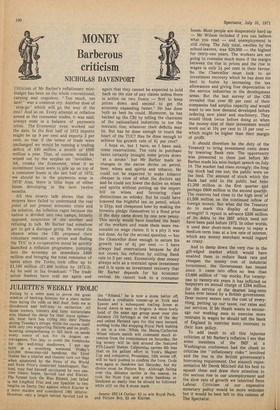MONEY Barberous criticism
NICHOLAS DAVENPORT
Criticism of Mr Barber's reflationary minibudget has been on the whole conventional, carping and crapulent. "Too much, too late! " was a common cry. Another dose of ' stop-go' which will go the way of the rest! And so on. Every attempt at reflation aimed at the consumer trades, it was said, always ends in a balance of payments crisis. The Economist even worked out the date. In the first half of 1972 imports might be up g per cent and exports 3 per cent, so that if the terms of trade were unchanged we would be running a trading deficit of £40 million a month or £500 million a year. That, of course, would be wiped out by the surplus on ' invisibles.' Ah, croaks the Economist, what if an investment boom were to pile up on top of a consumer boom in the last half of 1972; we should be in the payments soup in 1973! Alas, there is little hope of either boom developing in the next twelve months.
All this misery talk shows that the mopers have failed to understand the real point of our present economic crisis and its solution. An inflation rages because the nation is divided into two camps, bitterly opposed, suspicious of one another and refusing to talk. Mr Barber had somehow got to get a dialogue going. He seized the chance when the CBI proposed their voluntary restraint on prices and finding the TUC in a co-operative mood he quickly launched a reflation programme, pumping into the economy an immediate £400 million and bringing the total remission of taxes since the Tories, took office up to £1,100 million (£1,400 million by 1972-3). As he said in his broadcast: "The trade union leaders have told me again and again that they cannot be expected to hold back on the size of pay claims unless there is action on two fronts — first to keep prices down and second to get the economy expanding faster." He has done both as best he could. Moreover, he has backed up the CBI by telling the chairmen of the nationalised industries to toe the restraint line, whatever their deficits may be. But has he done enough to touch the heart of the TUC? Has he done enough to achieve his growth rate of 4i per cent?
I hope so, but I have, as I have said, some reservations. The cuts in purchase taxes certainly brought some prices down 'at a stroke' but Mr Barber made no changes in the excise duties on petrol, beer, wines and spirits and tobacco. He could not be expected to make tobacco cheaper in view of what the doctors say and he could not lower the duties on wines and spirits without putting up the import bill on wines and favouring class distinctions on whisky. But he could have lowered the frightful tax on petrol, which is 224p, and cheapened beer by making the brewers pledge themselves to a fixed price if the duty came down by one new penny. This surely would have touched the heart of the workers and made them more reasonable on wage claims. It is a pity it was not done. As for the second question — has the Chancellor done enough to secure his growth rate of 4i per cent — I have always had reservations because he did not crown his reflation by cutting Bank rate to 5 per cent. Excessively dear money always acts as a restraint upon investment and it is upon an investment recovery that Mr Barber depends for his economic revival. He cannot look to a consumer










































 Previous page
Previous page